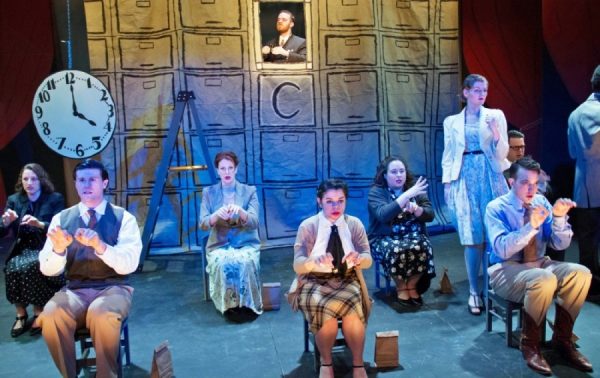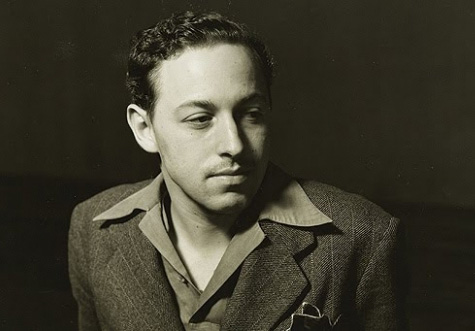
Tennessee Williams wrote Stairs to the Roof in 1941, just before his breakthrough, The Glass Menagerie. Both works share a protagonist who rebels against conformity, idealistically searching for a change of scenery — very much like Williams himself at that time. Yet where The Glass Menagerie is safely ensconced in the modern theatrical canon, Stairs to the Roof has never been staged in Philadelphia, or in New York, as far as I can tell. And for good reason: Whereas Menagerie is serious drama, Stairs to the Roof is sheer fantasy.
The opening scene finds employees at the Consolidated Shirtmakers Company robotically going through their automated office routines at typewriters and file cabinets, much as in The Adding Machine, Elmer Rice’s satirical 1923 send-up of modern conformity.
The Williams surrogate, named Benjamin Murphy, complains that the air in the office is as thick as molasses. He gags at the relentless tedium and attempts to escape the cage that he feels trapping him. During lunch hour, he ascends stairs from his 16th-floor office up to a roof where he finds a wider view and a chance for freedom. Here, he goes on a surrealistic adventure that involves liberating foxes in the zoo and romancing a woman who is not his demanding wife.
Williams’ subtitle sums up the play: “Stairs – A Prayer for the Wild of Heart That are Kept in Cages.”
Williams, you may recall, was employed in real life by the International Shoe Company in St. Louis, where he witnessed firsthand what he called “the gradual grinding down of the lives of the little people.” Presumably he was struggling to find a voice that would proclaim his solidarity with the working classes. His Benjamin character reflects the playwright’s earnest idealism at that point.
The play is full of vivid, purplish prose that surely isn’t meant to be played straight. Here’s where director Lane Savadove’s stylized physical movements transform a bromidic script into sparkling entertainment. His cast often communicates the mechanism of office work by moving in slow motion. The actors’ physical gestures are deliberately broad, played for laughs. (Indeed, the Williams dialogue includes obvious gag lines.) The scenery is askew and off-kilter.
Savadove’s cast, largely drawn from faculty, students and alumni at Rowan University in South Jersey, prove themselves excellent new additions to Philadelphia’s theater community. Especially striking are Craig O’Brien as Ben, Lauren Berman as The Girl, Christopher Marlowe Roche as the mysterious Mr. E, plus Dana Orange, Matthew Weil, and Michael Pliskin.
On the right: Williams when he still was Tom 
Please share your thoughts and your opinions with us. Address to editor@theculturalcritic.com
Read other reviews on The Cultural Critic